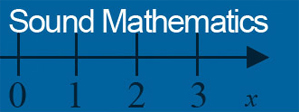A rather confused discussion of this statement appeared recently on http://www.linkedin.com/groups?home=&gid=33207&trk=anet_ug_hm
Here is my take on things:
Division by zero is undefined whether you work with real numbers or complex numbers. Khan’s video on the subject is a bit confusing. The consistent exposition of algebra is given in Euler’s “Elements of algebra”. There division is defined by saying that a/b=x, a unique number, such that bx=a. I am sure you can define it otherwise, making certain that there are no circular arguments involved, just as in Euler’s approach. Do not know why would one want to do it, but this is a separate issue. Using the commonly used Euler’s definition of multiplication (and multiplication rule x.0=0, for any x) and his definition of division we can show that division by zero is undefined:
The proof is carried out by reductio ad absurdum. Assume that a/0 IS defined, that is, there exists an unique number x, such that x.o=a. First let a^=0. Then, by definition, a=0.x. The number on the left of the = sign is 0 and the number on the right is not. Hence we arrived at a contradiction. Hence the assumption is wrong. Now let a=0. Then by definition, 0=x.0. Since all numbers satisfy this identity the assumption proves wrong again.
You can, of course, make an artificial distinction between the two cases of zero and non-zero numerator as Khan does and introduce two different words to distinguish between the two cases. This is not advisable for two reasons:
1. the real alternative is between having and not having an unique answer (known in advanced mathematics as the Fredholm alternative, would be a good idea to prepare students for dealing with it)
2. the word “indeterminate” is applied to a symbolic “solution” when seeking limits and it means “the formal solution does not produce an answer, some tricks are required to ‘resolve’ the indeterminancy, that is, determine (establish) the unique answer or else that there is more than one answer or no answer at all.”




No comments yet.